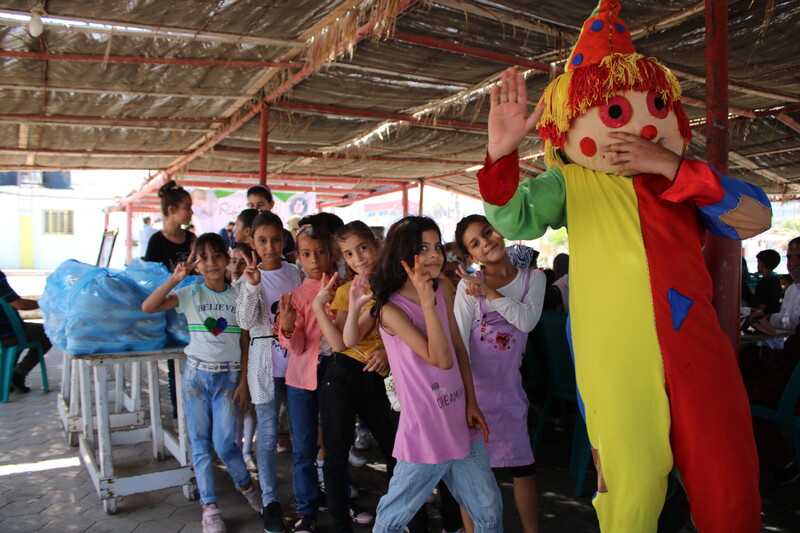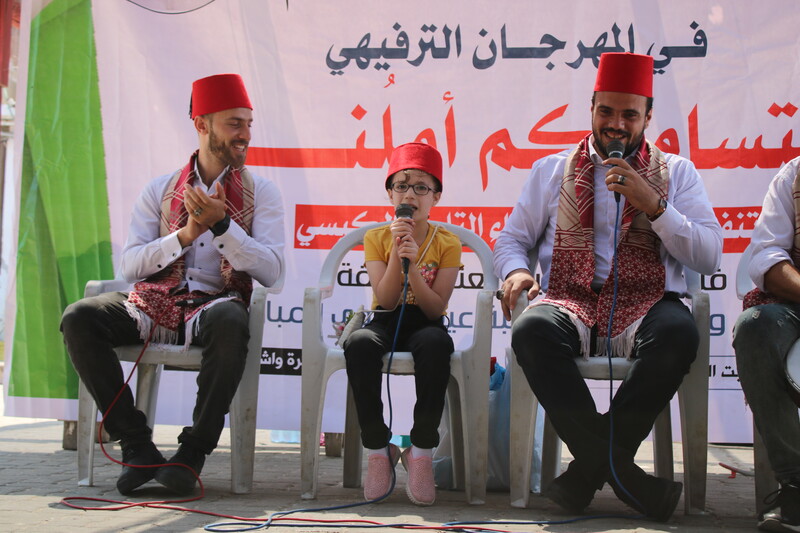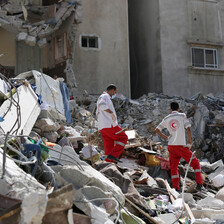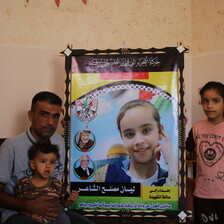The Electronic Intifada 22 October 2021

The Cystic Fibrosis Friends Society holds regular events for families of children with CF.
Layan Jamal needs close medical attention.
The 12-year-old has cystic fibrosis – an inherited condition that can cause severe damage to internal organs, the digestive system and the lungs.
The disease shortens life expectancy.
“I used to spend months at a time in hospital with Layan while she was a baby,” said her mother Nuha. “She suffered from chronic and severe inflammations in her lungs.”
Part of the problem is that Gaza hospitals are limited in their ability to diagnose cystic fibrosis. In Layan’s case, it took eight months before she was finally diagnosed.
In the UK and other countries, cystic fibrosis is diagnosed with three tests.
But only one of these, the so-called sweat test – which looks for abnormally high levels of salt in a person’s sweat – is available in the Gaza Strip.
Jihan el-Shanti is the mother of two sons, both diagnosed with CF. She said one of the main problems in the Gaza Strip is that of diagnosis.
Jihan lost a baby son in 2000 because he was not diagnosed in time, and therefore did not receive the appropriate medical care.
“The tragic memory will remain embedded deep in my heart,” Jihan told The Electronic Intifada. “But when, in 2005, I gave birth for a second time and noticed my baby also had the same symptoms, I was more aware.”
Raising awareness
The mother – then 22 – pursued and secured a referral to Jerusalem’s Hadassah hospital. There, her baby was diagnosed with cystic fibrosis.
“The disease is like a bad nightmare that continues to haunt me and my babies. But I did not surrender. I was determined to fight it by any means and provide the best treatment for my son,” she said.
As she and Ashraf, her husband, were trying to work out how best to take care of their baby, she became pregnant and gave birth again to another boy the very next year.
Again their newborn was diagnosed with cystic fibrosis.
“It was a shock, but neither I nor my husband collapsed. Instead we decided that this would only give us more strength to care for our sons,” she said.
In 2008, the couple founded the Cystic Fibrosis Friends Society in Gaza in a bid to reach out to families in similar situations. They wanted to raise awareness about CF, and give other parents a sense of support.
Today, the society supports 350 families across the coastal enclave.
Their work has been tireless and bore some fruit in 2018, when the society succeeded in ensuring an exemption of costs for treatment of children with cystic fibrosis, from both Gaza’s health ministry and the Palestinian Authority in Ramallah.
“It was such a relief for us that our children were able to get treatment, medicine and other supporting therapies like vitamins and food supplements for free,” she said.
However, the exemption was not renewed this year.
“We were shocked when we found out that the exemption was not renewed. Poor families are now forced to bear the cost of treatment with no help.”
According to Jihan, treatment can cost as much as $500 a month for every child.
About 80 percent of salaried employees in Gaza’s private sector took home less than that sum per month during 2020.
Nearly 60 percent of Gaza’s population already lives in poverty.
Despite several attempts to reach officials for comments, the ministry of health did not respond.
“Huge loss”
That was not the only blow. Parents have also found that fortified milk has not been available in Gaza’s pharmacies for a number of months.
Ashraf and Jihan attribute this to Israel’s blockade, which over nearly a decade and a half has imposed stringent and sometimes fairly random restrictions on what Israel will or will not allow into Gaza, leading to, among other essential items, a chronic shortage of medicine.
The couple’s dedication to serving families affected by cystic fibrosis has never wavered despite the challenges, however.
“I spend my whole time talking with other mothers to help them deal with their sick children,” said Jihan.
That can be anything from emotional support to practical advice on how to use inhalers.

It took eight months before Layan Jamal (center) was diagnosed with cystic fibrosis.
Indeed, the lack of education among parents about CF therapy and how to follow best practices is a primary challenge across Gaza, Jihan said.
The couple use Facebook as a primary means to share information about treatments, diets and therapies that can help parents of children with CF.
Ashraf said that a medical laboratory that the society used before Israel’s 2014 assault on Gaza used to play a key role in helping parents care for their children.
The lab was one of 73 health facilities damaged or destroyed in the Israeli 2014 attack, however.
“The lab was a great asset,” Ashraf told The Electronic Intifada. “It offered sweat tests and other CF-related help free to families. Sadly, until now we have not been able to compensate for that huge loss.”
Neglect
For Layan, the symptoms of cystic fibrosis have included malabsorption – when the body can’t absorb nutrients – and vitamin deficiency. The 12 year-old has had to miss years of school and is now only in the fourth rather than eighth grade.
“I suffered a lot with her, particularly during her early childhood when she needed to be hospitalized for long stretches and this has meant that she has not been able to study like other children her age,” Nuha said.
Layan’s family feels extremely upset about what they describe as neglect – by doctors and by society in general – of their daughter’s agony.
“We want to feel that our voices are heard and that people care about our children and don’t leave us to battle alone,” Layan’s mother said.
She said the family was very grateful for the efforts of the el-Shantis and the Cystic Fibrosis Friends Society, but that more was needed in Gaza.
“We want to have specialized health care units allocated for CF, and provide our children with treatment for free.”
Muhammad, 8 – a boy with cystic fibrosis – has a congenital anomaly that has affected the functioning of his digestive system.
He has undergone four surgeries already, the latest one in July in Egypt.
His mother, Iman, said that it took her a long time to get approval from both Gazan and Egyptian authorities for a referral to seek treatment in Egypt.
In the end, they received partial financial help to receive treatment but the family had to cover accommodation, travel and medicine expenses themselves.
“It cost me $1,000, which I borrowed from our relatives. My husband works as a taxi driver and could not pay the expenses for me and my son,” Iman said.
Muhammad returned from Egypt with instructions to follow a course of medicine and then receive electric convulsive therapy that is not available in Gaza.
“Doctors in Egypt told us that the surgery will not bear fruit without this kind of therapy,” she pointed out.
Iman is now seeking a medical referral permit for her son to go to Israel or the occupied West Bank to continue his treatment.
Ashraf el-Shanti noted, however, that the number of medical referrals allocated for cystic fibrosis patients is very low when compared with cancer or heart disease.
“CF is a serious condition, but there is always a hope that people can be helped,” he said. “Why not make all the effort to achieve this, including seeking treatment outside?”
Isra Saleh el-Namey is a journalist from Gaza.




